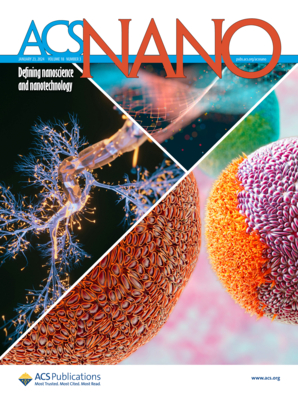Reconfigurable All-Nitride Magneto-Ionics
IF 15.8
1区 材料科学
Q1 CHEMISTRY, MULTIDISCIPLINARY
引用次数: 0
Abstract
The rapid advancement of generative artificial intelligence has significantly increased the demand for both energy and data storage. Magneto-ionics, which utilizes ionic motion to control magnetism, often driven by an electric field in heterostructures, has gained significant attention for its potential to enable energy-efficient modulation of magnetic properties with large effects. This study proposes a CMOS-compatible solid-state magneto-ionic system composed of all-Mn-nitrides and demonstrates that nitrogen ionic motion can induce reversible phase transitions between ferrimagnetic and antiferromagnetic Mn nitrides. This magnetic phase transition is manifested in dramatic changes in the resultant exchange bias effect, which can be increased by over an order of magnitude when more nitrogen is introduced into the nitrides during deposition and subsequently reduced by over 70% when nitrogen is taken out of the nitrides through post-annealing. Additionally, voltage-induced nitrogen ionic motion can lead to reversible changes in saturation magnetization and the exchange bias effect by 23% and 0.1 T (16%) at 5 K, respectively. These findings highlight the characteristics of this all-Mn-nitride system as an industrially viable and environmentally sustainable platform, offering tunable magnetic properties and energy-efficient operation and potential for magnetic field immunity.

可重构全氮磁离子
生成式人工智能的快速发展大大增加了对能源和数据存储的需求。磁离子学(Magneto-ionics)利用离子运动来控制磁性,通常由异质结构中的电场驱动,由于其具有巨大影响的节能调制磁性的潜力而获得了极大的关注。本研究提出了一种兼容cmos的全Mn-氮化物固态磁离子体系,并证明了氮离子运动可以诱导铁磁性和反铁磁性Mn-氮化物之间的可逆相变。这种磁相变表现在交换偏置效应的剧烈变化中,当沉积过程中向氮化物中引入更多的氮时,交换偏置效应可以增加一个数量级以上,随后通过退火后将氮从氮化物中取出时,交换偏置效应降低70%以上。此外,电压诱导的氮离子运动可导致饱和磁化强度和交换偏置效应在5k时分别发生23%和0.1 T(16%)的可逆变化。这些发现突出了这种全氮化锰系统作为工业上可行和环境可持续发展平台的特点,提供可调的磁性能、节能操作和磁场抗扰潜力。
本文章由计算机程序翻译,如有差异,请以英文原文为准。
求助全文
约1分钟内获得全文
求助全文
来源期刊

ACS Nano
工程技术-材料科学:综合
CiteScore
26.00
自引率
4.10%
发文量
1627
审稿时长
1.7 months
期刊介绍:
ACS Nano, published monthly, serves as an international forum for comprehensive articles on nanoscience and nanotechnology research at the intersections of chemistry, biology, materials science, physics, and engineering. The journal fosters communication among scientists in these communities, facilitating collaboration, new research opportunities, and advancements through discoveries. ACS Nano covers synthesis, assembly, characterization, theory, and simulation of nanostructures, nanobiotechnology, nanofabrication, methods and tools for nanoscience and nanotechnology, and self- and directed-assembly. Alongside original research articles, it offers thorough reviews, perspectives on cutting-edge research, and discussions envisioning the future of nanoscience and nanotechnology.
 求助内容:
求助内容: 应助结果提醒方式:
应助结果提醒方式:


